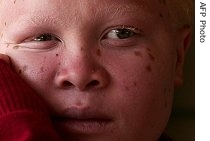2007年VOA标准英语-Number of Abandoned Babies in S. Africa Increas(在线收听)
Johannesburg
03 July 2007
Welfare organizations say there has been a dramatic increase in the number of abandoned babies in South Africa in the past year. VOA's Delia Robertson reports from our bureau in Johannesburg.
 |
| HIV-positive Tommy Jarvis, 13, was abandoned in a bar as a baby and given just weeks to live by doctors, Johannesburg, 13 Jun 2007 |
"It used to be 16-17 per month but now it has increased drastically. Per month, for now we receive about 28, 32 or less," said Msibi. "That's why I was saying it varies per month."
Msibi says that the babies are being found in a variety of circumstances.
"Some are abandoned in hospitals and then some in left in public places, and some are left in open veld [open areas] in the townships, and then some are left in taxi ranks or just inside the taxi, and then some are left with child minders," she said.
The overwhelming number of mothers who abandon their babies are between 16 and 23 years old; many have been raped; others cut adrift by the child's father when he learns of the pregnancy. As many as 50 percent are refugees or illegal immigrants from countries like Zimbabwe, who are unable to cope with a child.
Msibi says the catalyst for abandonment can be poverty, shame, or parental pressure. In many cases she says, it is HIV/AIDS.
"I think HIV/AIDS, that is one reason. Because young mothers - they often find themselves unable to cope with the demands of raising this HIV-positive baby, and also they themselves they are sick and then they end up abandoning this child," said Msibi.
Welfare organizations are able to reunite about 50 percent of the abandoned babies with their mothers. Msibi says these reunions are carefully managed.
"We will reach out, go out and double check and thereafter we will interview and we will find out yes this is the biological mother of this baby, and the very same young mother will also be counseled giving information and also all the skills that she will need as a parent," said Msibi.
Most babies who cannot be reunited with their mothers become available for fostering or adoption; but even though there is no discrimination against single parents, same sex couples, and adults of different racial groups, the number of available babies far outweighs the list of potential foster or adoptive parents. Welfare organizations hope to change this through public appeals.